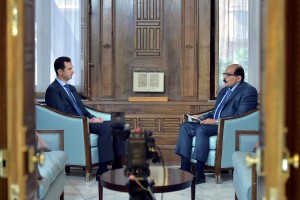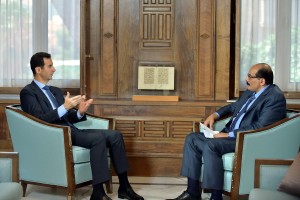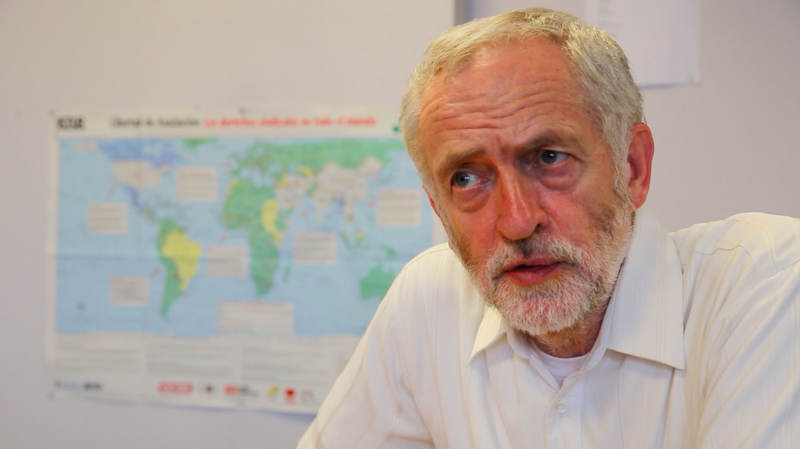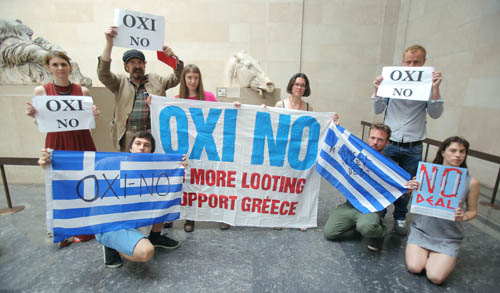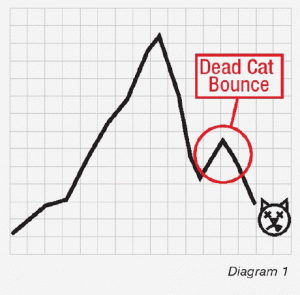The World’s attention has been drawn to the very North for several years now, as the Arctic reveals its potential filled with energy and mineral resources. A rush for the new Klondike has begun since the second half of the twentieth century, mainly in the vast northern Russia; but also in Yukon and Alaska. Oil fields are popping up at an astounding rate as new assessments of potential reserves of oil and gas flow pushed by the promess of large profits with the barrel valued at more than $ 100.00,
(http://www. mondialisation.ca/la-ru-e-vers-les-ressources-nerg-tiques-de-l-arctique/9115).
Another factor favoring this craze towards the Arctic is the ice cap melting faster than expected which creates a free marine passage between Europe and Asia.
If companies are about to hit a great deal, we must fear the impact of Arctic natural resources exploitation on wildlife habitats, which are already undermined by the effect of climatic changes. In this context, our attention turns toward the polar bear, the emblem of the Arctic, because it will have to adapt to major changes in its habitat. Recall that the Arctic name comes from the ancient Greek ἄρκτος (Arktos) meaning bear in reference to the constellations of Ursa Major and Ursa Minor, both located near the north celestial pole.
We propose here to give an overview of polar bears actual situation (Ursus maritimus) throughout the circumpolar world. We will present the phenomenon of melting ice which is considered as the main threat to bear’s habitat and we will outline the main elements of the the species management plan, coordinated and implemented as a cooperative effort between the Arctic states of Canada, Norway, Russia, the United States and Denmark.
I. The Arctic
An immense territory, cold and arid (Figure 1)
The Arctic is a vast area covering about 18 million square kilometers, representing an even greater surface than the russian territory of 17,098,242 square kilometers. Caracterized by long, cold winters contrasting with short, cool summers; this area receive few solar radiation due to its inclination toward the tropics (where the sun is directly overhead). During the theoretically six month lasting winter, the sun is completely absent. The temperatures are usually below – 10 ° C, but they approach 0 ° C at the North Pole in July and August.
“The cold winter temperatures (monthly averages below – 10 ° C to – 20 ° C) greatly influence the biodiversity within the Arctic. The region is caracterized by the presence of a persistent frozen ground (permafrost) to a great depth, even under the seabed. The long lasting snow cover duration and the prevalence of ice (marsh, lake, river and coastal) prevent the circulation of surface water for a period of almost 200 days a year. The ice sheets persistence (Greenland) and the island caps (Spitzberg, Baffin Island, etc.) whose emissaries give birth to small icebergs. ”
“Because the Arctic heart is the seat of an anticyclone, the region displays a certain aridity featuring frosty deserts. The region’s precipitation average is of 250 mm annually, mostly in the form of snow. However, Atlantic disturbances affect the climat all year long bringing winds, fog and snow. The presence of the Greenland ice sheet and the large volume of sea ice help maintaining cool temperatures throughout the year, although the coastal fringes are somehow warmer during the short summers. ”
“Minimum temperatures up to – 70 ° C were recorded in Greenland and Verkhoyansk, Siberia. Although the arctic winds are less common and weaker than the ones found in South Pole, Arctic coastal areas can still be severely swept by storms. ”
“The polar night lasts about five months, after which arises a one month period of days and nights alternance. At first, the days are very short, and then they gradually lengthen to last 24 hours reaching what we call the polar day, which lasts about five months ” (http://www.larousse.fr/encyclopedie/autre -region / Arctic / 106015).
Figure 1. The Arctic space or Top of the World

Source : http://photojournal.jpl.nasa.gov/jpeg/PIA02970.j
The peoples of the Arctic (Figure 2)
The name “Arctic” also refers to the Inuit people, whose are present from Greenland to Eastern Siberia, through northern Canada and Alaska, including the Yupik nation of Alaska and Siberia and the Sami nation of northern Scandinavia and northwest of Russia. There are about 20 others nations living in the Arctic Siberian Russia. Among them, we find the Yakuts one hand, and the so-called “Small Northern peoples” on the other Aleuts, the Dolgans the Evens, the Evenks, the Ket people, the Khanty, the Koryak, the Mansi, the Nenets, the Nganasans the Selkup people, the Chukchi, the Youkaghirs etc …)
(http://www.underthepole.com/milieu -polaire / the-peoples-de-larctique /).
“The Arctic is occupied by man since a very long time, for instance the Inuit nation from Mongolian is one famous civilization that first colonized the territory. They envaded the Arctic from Asia about 10 000 years ago most likely to ensure their subsistence based on fishing and big mammals hunting such as seals, walruses, whales and caribou. Nowadays, farming, hunting and fishing have undergone profound changes but traditional practices still carry on in few remote areas. ”
“The Lapps, people of Finno-Ugric origin, are present in the north of Norway, Sweden and Finland, as well as in north-west Russia (these territories constituting the Lapland). Mainly land reindeer hunters and fishermen along the coast, the Lapps have developed in recent years sedentary activities, such as reindeer husbandry. “
Figure 2. Arctic Peoples
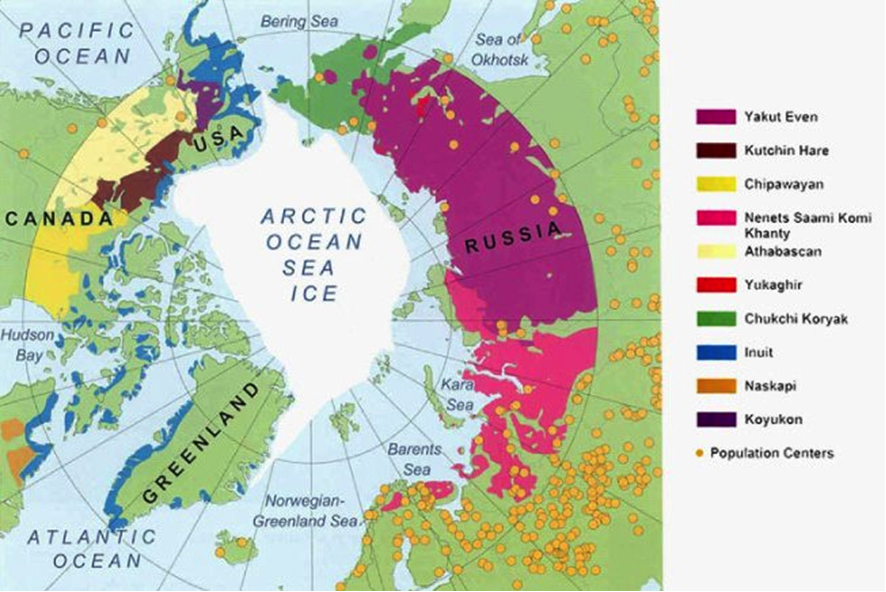
Source: http://www.underthepole.com/milieu-polaire/les-peuples-de-larctique/
Political organizations (Figure 3)
Arctic nations are grouped around six organizations for the defence of their rights and their political and economic interests. We have the Saami Council – SC, the Aleut International Association – AIA, the Arctic Athabaskan Council – AAC, the Inuit Circumpolar Council and the Gwich’in Council International – GCI (http://www.underthepole.com/milieu-polaire/les-peuples-de-larctique/).
Figure 3. Political Organizations of Arctic peoples
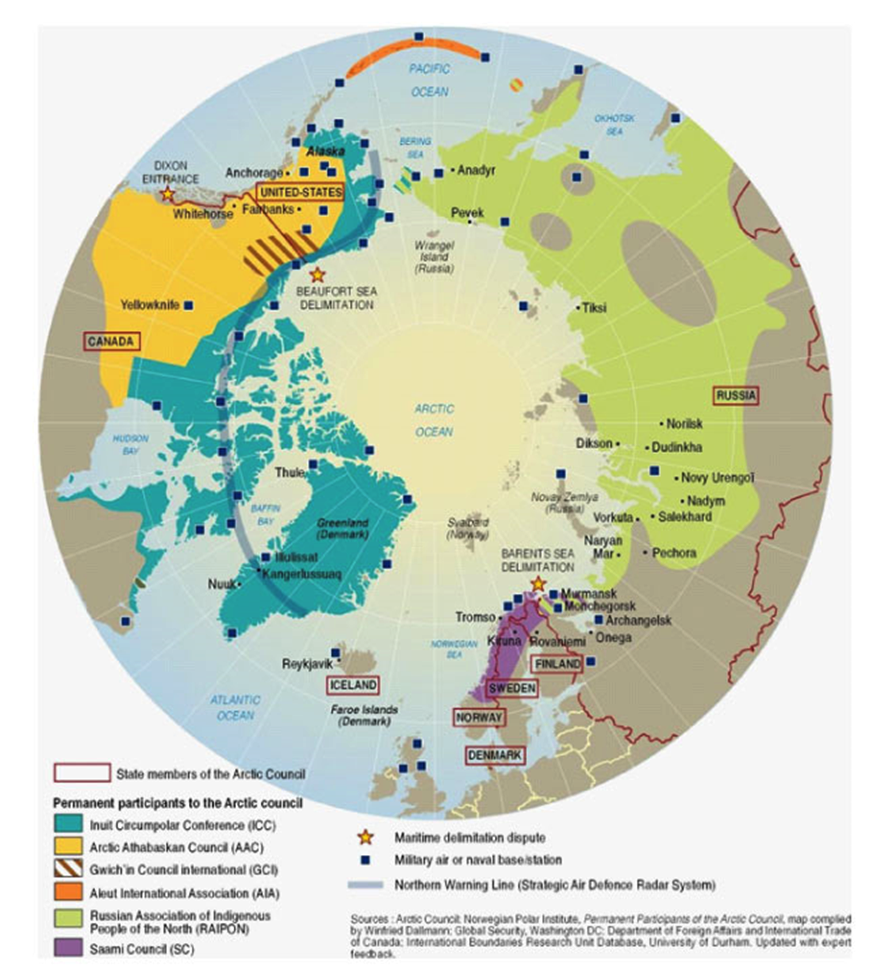
Source: http://www.underthepole.com/milieu-polaire/les-peuples-de-larctique/
II. The Arctic Biodiversity
The Arctic biodiversity is very rich. It reaches its greatest development in polynyas (Figure 4). These areas play an important role in the ecology of the Arctic Ocean. They offer open water to marine mammals, such as penguins and polar bears that do not migrate during winter. Plankton wealth – that can develop when the Sun appears – brought by polynyas, initiates the Arctic food chain, allowing wildlife to thrive
(http://www.arctic-council.org/index.php/en/resources/news-and-press/news-archive/918-arctic-oases-the-role-of-polynyas).
These marine ecosystems are among the most productive in the world. Many species of invertebrates, fish, birds and marine mammals are found in these sites considered the most important biological hotspots in the Arctic. For example, the entire world population of spectacled eider, a large sea duck, overwinters in the sea ice south of St. Lawrence Island in the eastern Bering Sea. Large recurring polynyas provide the conditions for a wide range of birds during winter as well as for ice species such as seals and whales
(http://www.arctic-council.org/index.php/en/resources/news-and-press/news-archive/918-arctic-oases-the-role-of-polynyas).
Figure 4. Location of concentrations of polynyas in the Arctic Ocean
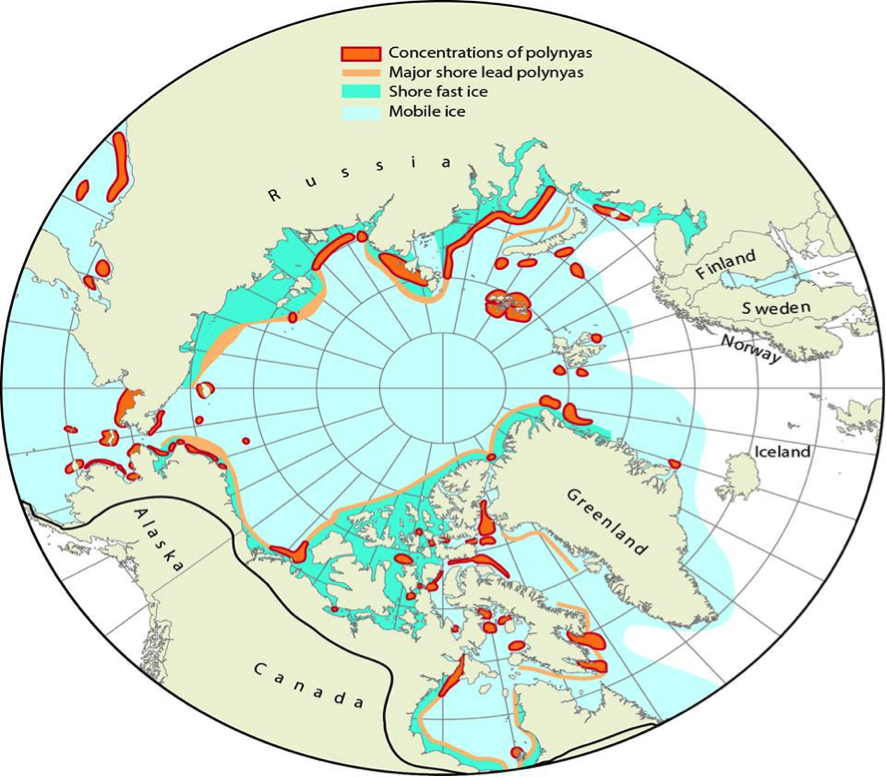
Source: http://www.arctic-council.org/index.php/en/resources/news-and-press/news-archive/918-arctic-oases-the-role-of-polynyas
III. The polar bear (Figures 5 and 6)
The polar bear, also called the Lord, is the emblem of the Arctic. It is the largest urside of the planet and most likely the deadliest Arctic predator. Powerful symbol of strength and resistance, this tireless hunter sees its survival threatened by global warming. Its critical habitat depends upon the presence of delicate sea ice on which the very foundation of the entire Arctic ecosystem is balanced. This sea ice is now literally melting between the polar bears’ legs. Its scientific name Ursus maritimus means “sea-bear” a great fitting name for an animal who spent most of its lifetime in the freezing water (http: //www.wwf.ca/fr/conservation/arctique/faune_arctique/ours_polaire/).
Figure 5. On the Hudson Bay during a hunting trip north of Sanikiluaq (ᓴᓂᑭᓗᐊᖅ) on the north shore of Flaherty Island Belcher Islands in Hudson Bay in the Qikiqtaaluk region of Nunavut Canada. It is the southernmost community of the territory. Photo taken in February 2015.

Source: Piita Kattuk, member of the Eeyou Marine Region Wildlife Board.
Figure 6. Akpatok Island, Ungava Bay. Nunavut. Hunting polar bear destination for Nunavik Inuit

Source: http://earthobservatory.nasa.gov/IOTD/view.php?id=2223
The population of the polar bear and its spatial distribution
According to data harvested in the circumpolar Management Plan – Draft – 2014 the population of polar bears has been estimated at 20 000 to 25 000 individuals. Canada displays the largest coastline inhabited by polar bears, followed by Russia, Greenland, the United States and Norway (see Figure 7 and Table 1). This large area of over 22 million square kilometers is mainly composed of Canadian Arctic archipelago, recognized for its large biological productivity, which most certainly justifiies the preference of polar bears for the region. Their number in the area is estimated at 16,413 individuals, where more than the two third of the total population is found in 13 of the 19 Arctic subpopulations (Management Plan – Draft – 2014).
Polar bears’ most active denning area is found on Akimiski Island in James Bay, Canada. Despite a confirmed presence in High Arctic around Ellesmere Island and northern Greenland, polar bears are more active in southern areas. This geographic repartition could be explained by better ice conditions in southern areas and the lack of food in deep waters.”(Draft Management Plan -. 2014).
Figure 7. Limits Range in polar bear populations since June 2014
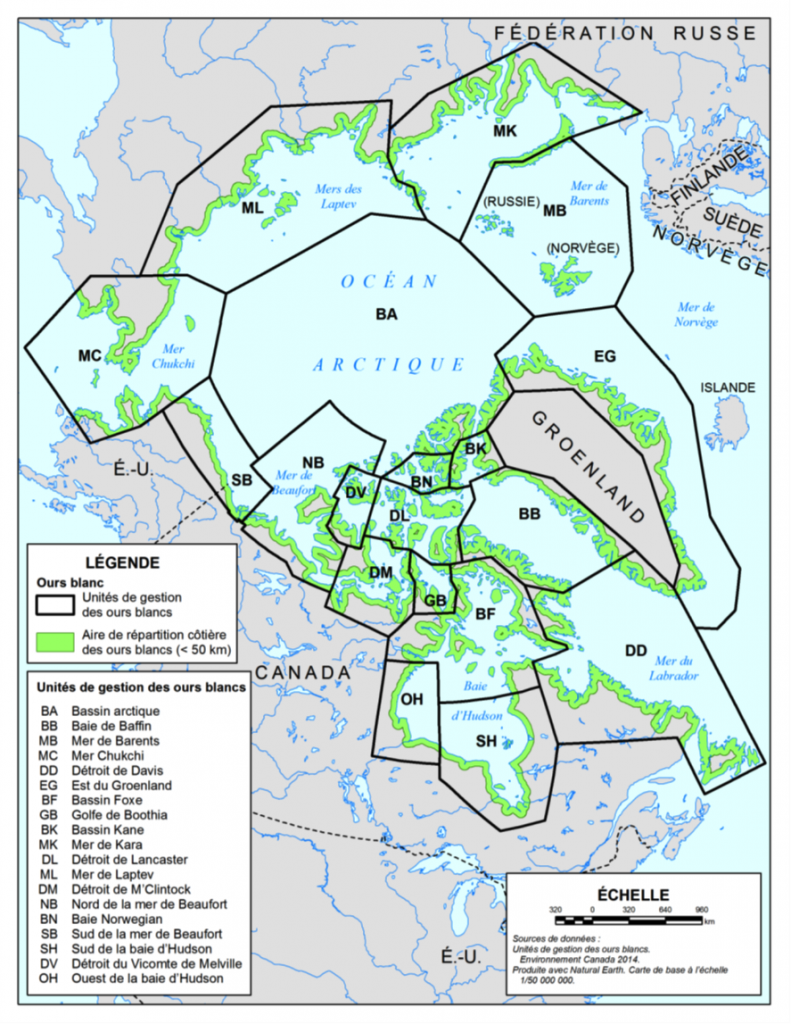 Source : Circumpolar Action Plan Draft Volume I – Conservation Strategy for the Polar Bear – August 2014
Source : Circumpolar Action Plan Draft Volume I – Conservation Strategy for the Polar Bear – August 2014
Table 1: Data of PBSG on subpopulations of polar bears throughout the Arctic – 2014
Arctic Basin (AB): Unknown Population; area of the management unit: 4,233,530 km2 Territory: Circumpolar Region.
Baffin Bay (BB): Estimated enrollment of 1,546 individuals in 2004 on an area of 1,078,840 km2 – Territories: Canada (Nunavut) and Greenland.
Barents Sea (BS): Estimated enrollment of 2,644 individuals in 2004 on an area of 1,691,458 km2 – Territories: Norway and Russia.
Sea Tchoukthes (CS): Estimated enrollment of 2,000 individuals in 1993 on an area covering an area of 1,836,922 km2 – Territories: Russia and the United States.
Davis Strait (DS): Estimated enrollment of 2,158 individuals in 2007 on a space with an area of 2,620,106 km2 – Territories: Canada (Nunavut, Quebec, Newfoundland and Labrador) and Greenland.
East Greenland (EG): unknown Employees – Area: 2,054,115 km2 – Territory: Greenland
Foxe Basin (FB): 2,580 people in 2010 over an area of 1,181,019 km2 – Territory: Canada (Nunavut, Quebec)
Gulf of Boothia (GB): Estimated population of 1,592 individuals in 2000 on an area of 171,136 km2 – Territory: Canada (Nunavut)
Kane Basin (KB): Estimated enrollment of 164 individuals in 1997 on an area of 166,514 km2 – Territories: Canada (Nunavut) and Greenland.
Kara Sea (KS): Unknown Numbers – area of 1,763,680 km2 – Territory: Russia.
Lancaster Sound (LS): Estimated enrollment of 2,541 individuals in 1998 on an area of 487,532 km2 – Territory: Canada (Nunavut).
Laptev Sea (LP): From 800 to 1200 individuals in 1993 over an area of 2,459,282 km2 – Territory: Russia.
M’Clintock Channel (TM): Estimated population of 284 individuals in 2000 on an area of 495,256 km2 – Territory: Canada (Nunavut)
Northern Beaufort Sea (NB): Estimated enrollment of 2,191 individuals in 2014 over an area of 944,667 km2 – Territory: Canada (Nunavut, Northwest Territories)
Norwegian Bay (NW): Estimated enrollment of 203 individuals in 1997 on an area of 147,262 km2 – Territory: Canada (Nunavut)
Southern Beaufort Sea (SB): Estimated population of 1,215 individuals in 2014 over an area of 715,030 km2 – Territories: Canada (Yukon, Northwest Territories) and the United States.
Southern Hudson Bay (SH): Estimated enrollment of 951 individuals in 2012 over an area of 1,135,249 km2 – Territory: Canada (Nunavut, Quebec, Ontario)
Detroit Viscount Melville (VM): Estimated population of 161 individuals in 1992 on an area of 209,962 km2 – Territory: Canada (Nunavut)
Western Hudson Bay (WH): Estimated population of 1,030 individuals in 2011 on an area of 502,379 km2 – Territory: Canada (Manitoba, Nunavut)
Source: Action Plan – Conservation Strategy of the polar bear (draft). August 2014
Subpopulations trends (Figure 8)
The establishment of the situation on the 19 subpopulations trends shows that over the last twelve years, researchers based on the Detroit M’Clintock saw one subpopulation size increases, three others decrease and six remained stable. The remianing subpopulations size remain unknown (http://pbsg.npolar.no/en/status/status-table.html). We just learned that the Norwegians and the Russians will cooperate for counting subpopulations of their territory which have not been done over the last 11 years (barentsobserver.com).
Figure 8. Subpopulations trends

Source: http://www.wwf.ca/fr/conservation/arctique/faune_arctique/ours_polaire/
Its habitat
The polar bear is considered a marine mammal. Its average weight is between 400 and 600 kg (male) and between 150 and 250 kg (female). Its life expectancy is about 25 years. Its preferred habitat is located on the glaciated areas near open water portions. He uses ice as a platform to feed on its favorite food, ringed seals, one of the species of common seals in the Arctic. They also eat bearded seals, harp seals, and harbor seals. The polar bear uses its sense of smell to detect the breathing of seals that can be up to a kilometer away. It may hunt walrus, beluga and narwhal. Because of its difficulties to feed, the polar bear has the ability to slow down its metabolism in order to conserve energy without feeding up to ten days
(http://www.canadiangeographic.ca/kids/animal-facts /polar_bear.asp).
The polar bear is an excellent swimmer. His thick layer of fat allows him to keep warm and helps flotting. His large feet serve as oars. It can swim up to a speed of 10 kilometers per hour and cover a distance of 90 kilometers without stopping. He can hold his breath under water for one minute (http://www.canadiangeographic.ca/kids/animal-facts/polar_bear.asp) (Figure 9).
Figure 9. On the Hudson Bay during a hunting trip near Sanikiluaq (ᓴᓂᑭᓗᐊᖅ) located on the north shore of Flaherty Island Belcher Islands in Hudson Bay in the Qikiqtaaluk region of Nunavut in Canada. It is the southernmost community of the territory.

Source: Piita Kattuk, member of the Eeyou Marine Region Wildlife Board.
Life on the ice
“The future of the polar bear is inseparable from the fate of its habitat, the sea ice. Less ice, fewer bears. But global warming results in the reduction of the ice cover in summer and thicker layers in winter, which ultimately threatens the bear survival. The ice pack is the foundation of Arctic marine life; the ecosystem on which all aspects of the bear’s life is based. In fact, the ice is more than a hunting space, its also a nursery ”
(http://www.wwf.ca/fr/ conservation / Arctic / faune_arctique / ours_polaire /).
The females give birth every three years. They usually give birth to one or two offspring, it can be up to four cubs per litter.
The main threats to its habitat
According to the Polar Bear Specialist Group (PBSG), the main threats to the polar bear habitat is melting sea ice due to climate change, diseases, deaths caused by man, and oil activities gas, mining, contaminants, navigation and tourism. Given the crucial importance of the presence of sea ice for the polar bear we provide an overview of the process of melting and thinning observed for the last thirty years, and then an idea of the risks surrounding the oil and gas.
The relentless melting of the Arctic ice (figure 9)
According to Michel Alberganti, using data from the Goddard Space Flight Center, “the surface of the Arctic Ocean covered by ice has reached 5.83 million square kilometersin 2013, against the minimum of 4.34 million square kilometersregistered in August 2012, and even 3.41 million square kilometersSeptember 16: “In 2012, the coverage rate did not exceed half the average recorded between 1979 and 2010” (http: //www.slate.com / life / 77458 / Kick-cold Arctic) (figure 10). Indeed, in 2012, according to analysis and preliminary observations from the National Snow and Ice Data Center (NSIDC) (University of Colorado at Boulder), the Arctic sea ice reached its lowest level in over 30 years! An alarming trend according to scientists.
“For the first time, Arctic sea ice reached its lowest since satellite observations (1979), beating the 2007 record. The extent of sea ice was only 4.10 million square kilometersin August 26 2012. This is 70,000 square kilometers less than the previous record registered on 18 September 2007. This corresponds to a loss equivalent to the size of Ireland. On 5 September 2012, the ice was still melting with an area of less than 4 million kilometers square, about ten days after the end of the Arctic melt season “.
Figure 10. Extension monthly average of sea ice in the Arctic (December 1978-2013)
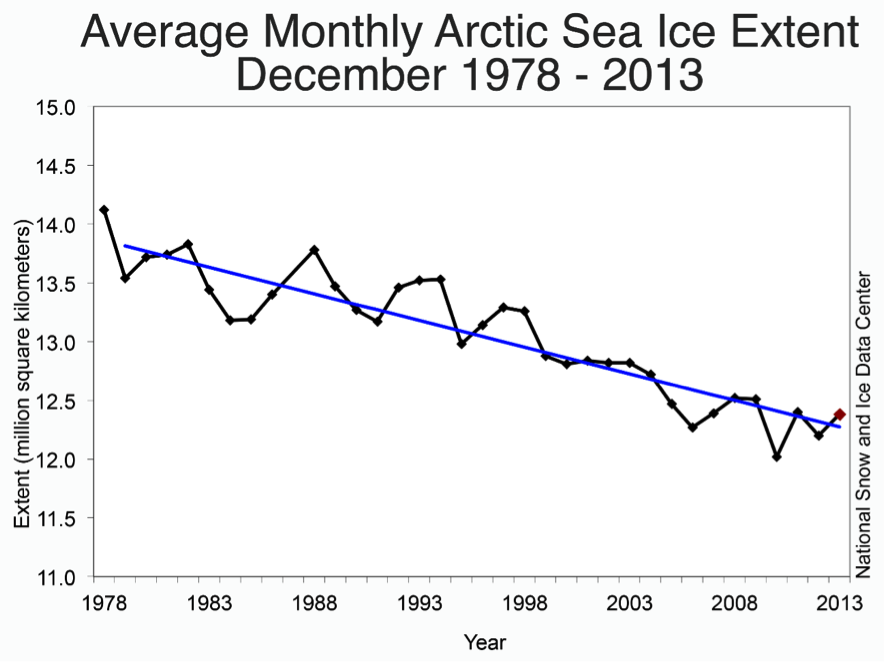 Source: http://sciences.blogs.liberation.fr/home/2014/01/banquises-arctique-et-antarctique-sopposent.html
Source: http://sciences.blogs.liberation.fr/home/2014/01/banquises-arctique-et-antarctique-sopposent.html
“Walt Meier, a scientist at NSIDC said,” By itself, it is only a number and sometimes new records were established. But in the context of what has happened in recent years and over satellite observations, it is an indication that the Arctic sea ice is changing fundamentally ”
(http://www.notre-planete.info/actualites/actu_3454_record_fonte_banquise_arctique.php).
Under the Arctic Sea Ice News & Analysis’ the extent of sea ice in December 2014 (Figure 12) showed an average of 12.52 million kilometers square, or 540,000 square kilometers below the average observed between 1981 and 2010 of 13,060,000 square kilometers and 500,000 square kilometers above the record for the month observed in 2010 “.
“The extent of sea ice in December 2014 ranked ninth of the lowest satellite data. For 2014, the rate of decline for December exceeds «Walt Meier, scientist at NSIDC said, “By itself, it is only a number and sometimes new records were established. But in the context of what has happened in recent years and via satellite observations, it is an indication that the Arctic sea ice is changing fundamentally “
(http://www.notre-planete.info/actualites/actu_3454_record_fonte_banquise_arctique.php).
As of March 20, 2015, the maximum ice extent of the Arctic Ocean appears to be the lowest ever measured. The maximum extent of Arctic ice was the lowest measured in winter this year since the beginning of satellite observations in 1979, said the American Center of snow and ice (National Snow and Ice Data Center / NSIDC). The surface of the sea ice has reached more than 14.54 million square kilometers on 25 February, which should be the maximum for the year, according to a preliminary estimate, representing 1.10 million square kilometers below the average of 15.64 million square kilometers measured from 1981 to 2010 and 130,000 square kilometers below the previous minimum in 2011.
This year, the maximum was reached two weeks earlier than the average between 1981 and 2010 according to the NSIDC. The date of the maximum extent of Arctic sea ice varies considerably from year to year from 24 February 1996 at the earliest to 2 April at the latest in 2010, specify these scientists (levif.be).
During the 2014-2015 winter, the ice in the Arctic Ocean rose by 9.91 million square kilometers, a much lower increase compared to 2013-2014, which saw a record increase. The low ice formation during this last winter was partial in February characterized by an unusual combination of the jet stream, which resulted in an Arctic warming of Pacific Ocean causing a small extent ice in the Bering Sea and Okhotsk. During the first two weeks of March, temperatures across the Arctic was about several degrees above average up ten degrees in the Barents Sea northern Norway, said the NSIDC.
For WWF “this should be a wake-up call.”
“Climate change will not stop at the Arctic Circle and without a drastic reduction greenhouse emissions, we will have a completely different climate, unpredictable and destructive to ecosystems and humans,” said in a statement Samantha Smith, head of the Climate and Energy Initiative of the organization. She recalled that 2014 was the warmest year on the globe since the beginning of temperature readings in 1881
(http://www.levif.be/actualite/environnement/l-etendue-maximum-des-glaces-de-l-ocean-arctique-la-plus-faible-jamais-mesuree/article-normal-372657.html).
the record of satellite data qui est 3.4% per decade ”
(http://nsidc.org/arcticseaicenews/2015/01/december-ends/).
Figure 11. Total area of Arctic sea ice – 2012 and 2013
 Source : http://www.notre-planete.info/actualites/actu_3454_record_fonte_banquise_arctique.php
Source : http://www.notre-planete.info/actualites/actu_3454_record_fonte_banquise_arctique.php
Figure 12. Extent of Arctic sea ice August 26, 2012 compared to the average minimum extent for the period 1979-2010 (orange line)
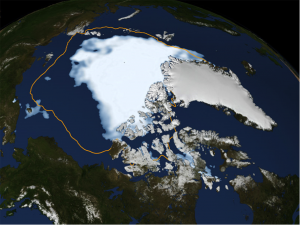
Source : http://www.notre-planete.info/actualites/actu_3454_record_fonte_banquise_arctique.php
Figure 13. Extension of Arctic sea ice in 2014. Maximum in March; minimum in September
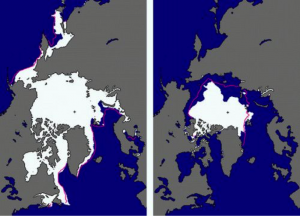
Source : http://www.clubdesargonautes.org/actualites/news2015.php –
Les lignes magenta indiquent les moyennes d’extension sur la période 1981-2010. Arctic Report Card 2014
The thinning of sea ice (Figure 14)
Using modern measurement techniques (since 2000 the records were replaced by a host of airborne measurements and satellites, as well as other data collection methods directly on or under the ice) and historical data, Washington University researchers were able to observe the way in which the thickness of Arctic sea ice has changed over the past decades. The study, published in The Cryophere, shows that the ice in the central Arctic Ocean has thinned by 65% between 1975 and 2012 from 3.59 m to 1.25 m.
The thinning is even more marked in September when the sea ice is at its thinnest after the summer melt. During this 37-year period of observation, the thickness of the ice in September has thinned by 85%, from 3.01 to 0.44 m: “The ice has thinned considerably said the Lead researcher Ron Lindsay, a climatologist from Applied Physics Laboratory of the University. We knew the ice was thinner, but we now have further confirmation on the speed with which the phenomenon occurs and we can see that it does not slow down ” (http://barentsobserver.com/en/nature/2015/03/arctic-sea-ice-thinning-dramatically-study-finds-06-03).
Figure 14. The melting of Arctic sea ice

Source : http://barentsobserver.com/en/nature/2015/03/arctic-sea-ice-thinning-dramatically-study-finds-06-03
Figure 15. The predicted changes for the twenty-first century in the Arctic
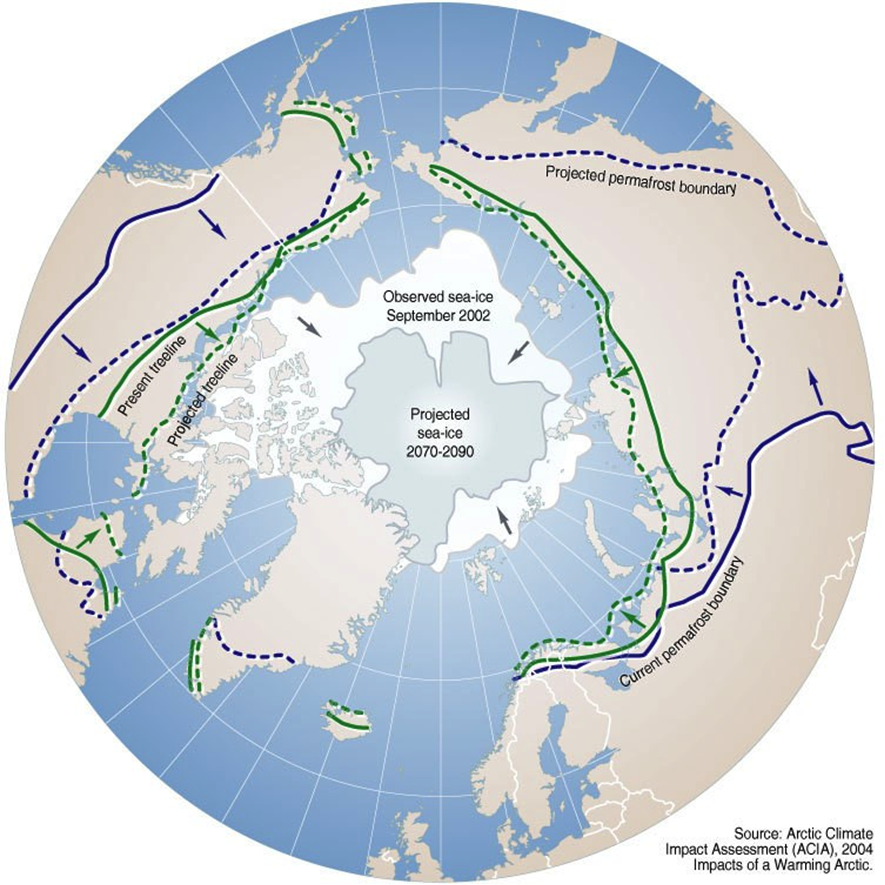
Source: http://www.grida.no/graphicslib/detail/shift-in-climatic-zones-arctic-scenario_1154
The scenarios presented by the Arctic Climate Impact Assessment (ACIA) shows a significant increase in temperatures in the Arctic, greatere than in many other parts of the world, which can have impacts such as tundra areas decrease in continuous permafrost, moving towards the north of the tree line and a reduced Arctic sea ice. The synthesis is based on several models and different sets. The map shows that the situation is likely to occur at the end of the XXI century (http://www.grida.no/graphicslib/detail/shift-in-climatic-zones -arctic-scenario_1154) (Figure 15).
The risks associated with oil and gas development (Figure 16)
Several oil and gas exploitation are currently active in the Arctic:
“The Prudhoe Bay site, one of the oldest in the Arctic, provides (2007) 700 Mbbl / d of oil, for the remaining reserves of 3 Gbbl; the maximum production was 2 Mbbl / d in 1988. It justified the establishment of the Alaska pipeline. In Russia, we have the Hammerfest LNG site, linked to Snøhvit. In addition, the Prirazlomnoe oilfield, discovered in 1989 in the south-east of the Barents Sea, the Gulf between the estuary of the Pechora and Novaya Zemlya, began to be exploited 24 years after Gazprom discharged in early May 2014 a first load of 70,000 tons of oil ARCO (brand new oil of the Russian Arctic shelf) of inferior quality compared to the Urals. The license for the deposit belongs to Gazprom Neft Shelf and the operator is Gazprom Neft; investments in the mining project on the Arctic shelf reach about 1.8 billion euros; Prirazlomnoe the platform was installed in August 2011 and started operation in late 2013; available reserves are estimated at 72 million tonnes; for 2014, the planned production of 300 000 tonnes ”
(http://fr.wikipedia.org/wiki/P%C3%A9trole_et_gaz_naturel_en_Arctique#Zones_en_cours_d.E2.80.99exploitation).
Figure 16. Environmental threats in the Barents Sea
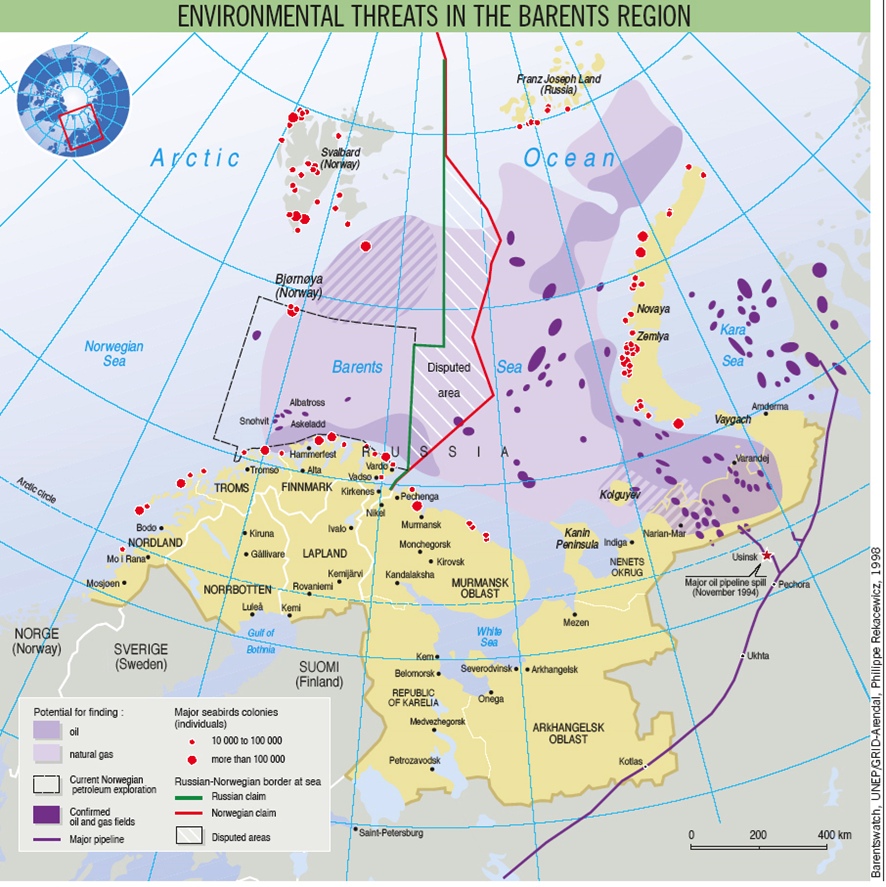
Source : http://www.grida.no/images/series/et-common/envthreatinregion_L.jpg
According to the PBSG, “oil spill in the polar bear habitat are particularly worrying. The exploration and oil and gas development in the Arctic increasing, coupled with increased transport associated with the longest season of open water, increase the potential for oil spills in the marine environment. ” (Action Plan – Conservation Strategy of the polar bear (draft) in August 2014.)
“In Russia, in general, the Pollution of the Russian Arctic Oil does not exceed the established maximum thresholds, except in some regions, particularly in the Barents Sea … In Alaska, since 2014, no major spill occurred. However, small chronic leaks from underwater pipelines could cause undetected release of large amounts of oil off … In Canada, since 2014, the only gas production within the range of Polar bear in the Canadian Arctic occurs in the deposit Ikhil in the Mackenzie Delta. The gas is produced from two wells, and is routed through a 50 km pipeline to Inuvik where it is used for power generation and heating … In Norway, at present, the only deposits of oil / gas subject to industrial development are those of Snøhvit and Goliat “(Action Plan – Conservation Strategy of the polar bear (draft) in August 2014).
IV. The Management Plan. A Circumpolar Cooperation (Figures 17, 18 and 19)
The state of the polar bear’s varies in function of the conservation efforts. The purpose of this Plan is:
– Ensure a long-term persistence of polar bear genetic bagage in the wilderness;
– Preserve a great range of polar bears ecological diversity and its habitat throughout the short and medium term Arctic.
“To protect the environment, the precautionary approach shall be widely applied by States according to their capabilities. Where there are threats of serious or irreversible damage, lack of full scientific certainty should not be an excuse for postponing the adoption of effective measures to prevent environmental degradation. ” (Principle 15 of the Rio Declaration on Environment and Development in 1992) .
Recognize that the polar bear is an important resource that plays a vital role in the social and cultural well-being of local communities in the Arctic. As well as recognize the subsistence needs of indigenous peoples in the Arctic, so that conservation is best achieved in partnership with communities traditionally dependent on polar bears and their participation in management decision making (Action Plan – Conservation Strategy of the polar bear (draft), August 2014).
Figure 17. Distribution of protected areas in the circumpolar region is wholly or partly within the potential range of polar bears
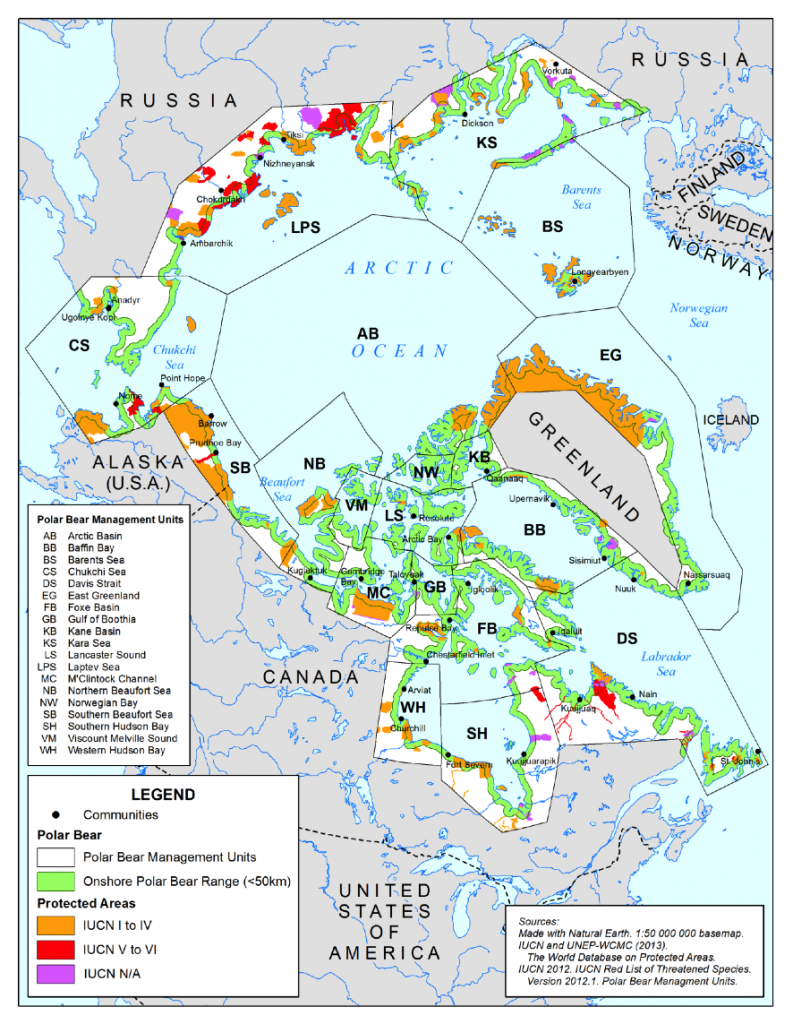 Source : Circumpolar Action Plan Draft Volume I – Conservation Strategy for the Polar Bear – August 2014.
Source : Circumpolar Action Plan Draft Volume I – Conservation Strategy for the Polar Bear – August 2014.
Figure 18. Protected areas and wilderness

Source : http://www.grida.no/graphicslib/detail/protected-areas-and-wilderness_60e9
Territories covered by legislation
The total marine area occupied by the sub-populations in the circumpolar region is estimated at 15,523,600 square kilometers, of which about 548 600 square kilometers (4%) are protected. The marine protected area is about two-thirds of the protected land area (circumpolar action plan Volume I. Conservation Strategy of the polar bear, August, 2014) (Figure 14).
Management of subpopulations habitats (Table 2)
Subpopulations habitat management systems are in place in all states based on national strategies and implementation plans that cover all areas frequented by the species. Numerous actions taken show a real will to reduce the vulnerability of ecosystems that support it. A beautiful illustration of this political will is found in Norway where we created free areas of oil exploitation in the Barents Sea (Figure 19).
Table 2. Plan of the Bear conservation systems throughout the circumpolar region
NORWAY
In Norway, with a total area of 1.4 million square kilometers, the Barents Sea is protected under the provisions of the Svalbard Act of 2002. In this region, more than 65% of the territory and 87% of marine areas are protected. A national action plan has been in force since 2013 and its revision is planned for 2018.
CANADA
Canada Arctic Islands are the favorite area of the polar bear which is under the authority of multiple laws. Therefore, there are five national wildlife areas, three marine protected areas, 11 national parks and 58 provincial parks land. It conducts an annual evaluation of the 13 sub-populations in the territory according to the National Conservation Strategy which was last revised in 2011.
RUSSIA
The territory covered by conservation measures covers an area of 1,763,680 square kilometers. This is primarily the Kara Sea and the Laptev Sea where applied the Federal Law on wildlife. There are four State Natural Reserves (zapovedniks) covering an area of 49,537 square kilometers, the National Russian Arctic Park with an area of 14 260 square kilometers , three national wildlife reserves, national parks and national marine reserve, five natural resource reserves of the Republic of Sakha (Yakutia). The Action Plan of the Russian Federation established in 2010 is in force until 2020.
DENMARK (GREENLAND)
The total area covered by the conservation measures is 2,054,115 square kilometers according to the provisions of the “Greenland Home Rule Act No. 12 of October 29, 1999, Hunting and Game” and the “Executive Order on the Protection and Hunting of Polar Bear “in 2006. Protected areas in the Melville Bay covers an area of 10 500 square kilometers and the Greenland National Park with 972,000 square kilometers. An assessment of sub-populations present in the area is coming.
UNITED STATES
The territories under conservation measures are the Chukchi Sea or Alaska Tchoukotk region and Southern Beaufort Sea with a total area of 715,030 square kilometers. On 7 December 2010, the Service has identified about 484,734 square kilometers as critical habitat for polar bears following three categories: sea ice, barrier islands as habitat resting and denning habitat
Chukchi Sea. The management of polar bears hunting is governed by the Agreement between the United States and the Russian Federation on the Conservation and Management of the Alaska-Chukotka Polar Bear Population. This agreement was enacted in the US in 2006. The Management was concluded in collaboration with Alaska Nanuuq Commission, the principal co-management partner established in 1994
Beaufort Sea. Subsistence hunting is regulated voluntarily through an agreement made in 1988 between the Inuvialuit of Canada and the Inupiat of Alaska (Inupiat-Inuvialuit Agreement for the Management of Polar Bears of the Southern Beaufort Sea), which promotes management based on a level of sustainable catches. The department conducts in collaboration with the North Slope Borough research activities and hunting management.
Source: Circumpolar Action Plan Draft Volume I – Conservation Strategy for the Polar Bear – August 2014.
Figure 19. Mer de Norvège et Mer de Barents. Zones exemptes de l’exploitation pétrolière
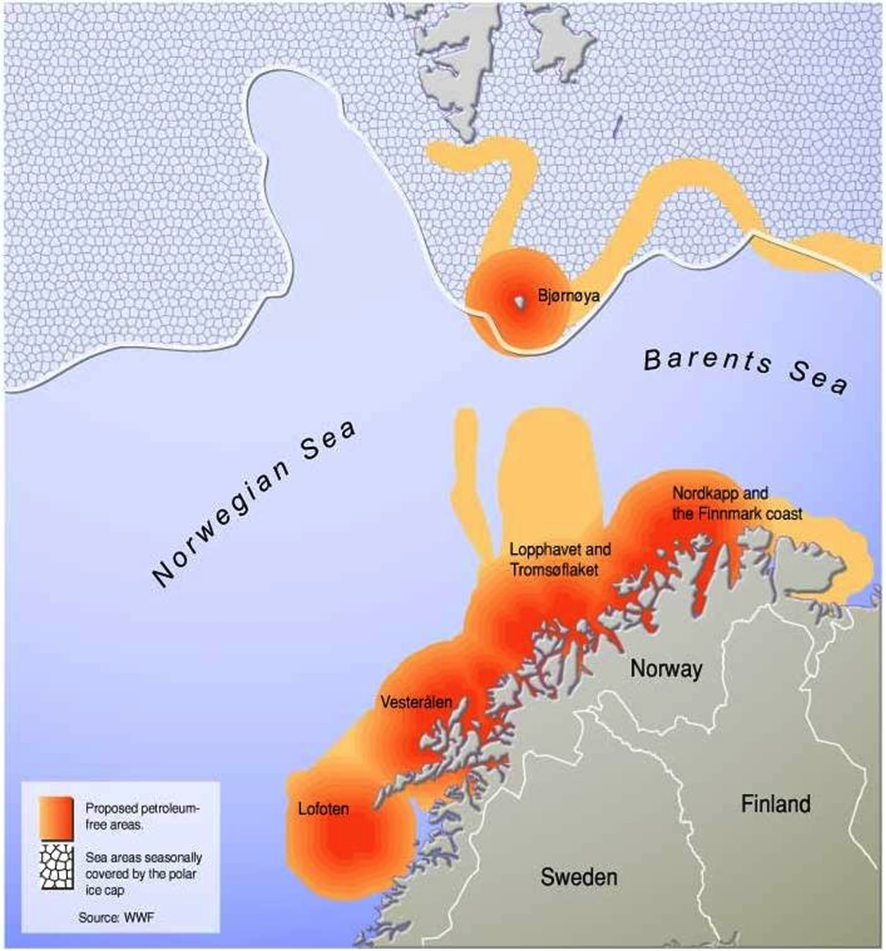
Source : http://www.grida.no/graphicslib/detail/barents-sea-oil-free-zones_f319
Conclusion
Most analyzes on the situation of the polar bear exhibit concerns about its survival after the ice will be gone. The terms used to describe the fate of the case are related to drama or disaster: The polar bear is endangered. A different view is found in Government of Nunavut that exposes a reassuring perspective: “Polar bears are very smart and quickly adapt to changing circumstances. As they have survived many climate change cycles in the past, they are likely to be able to adapt to changes that may occur in the future. However, it is quite possible that there are changes in their range and their composition. Some areas could see a fall in the polar bear population or disappearance in these regions during the hottest periods. Other regions could see an increase in the number of polar bears to measure that climate change will make the most favorable habitats for bears, driving the reduction in multi-year ice. In still other areas, the number and the reproductive rate of polar bears could remain relatively constant “(http://env.gov.nu.ca/sites/default/files/3154-315_climate_french_sm.pdf).
We believe that the efforts made by members of the Polar Bear Specialist Group (PBSG) in implementing the Plan of management of polar bear habitat have given and will give good results. The objectives are ensured by law conservation of resources upon which depends the species and the decrease of subpopulation vulnerability through careful management of polar bears habitats (circumpolar action plan Volume I. Conservation Strategy of the polar bear, August 2014).
2013 Declaration of Ministers of the countries of the circumpolar area on climate change and the extent and sea ice composition
According to the PBSG, “Environmental change is the most serious threat in the long term for the polar bear and its habitat. The projected warming in much of its range, the associated reductions in the extent and thickness of multi-year sea ice and the length and thickness of the annual sea ice will affect direct and indirect on the species. Habitat loss is one of the direct effects (ie extent of and composition of the sea ice). Indirect effects include changes throughout the ecosystem affecting the availability of prey such as seals, isolation dens areas and land shelters, the release and transfer of contaminants, and the expansion of human activities resulting in an increase in the likelihood of interactions between humans and bears. The earlier melting of sea ice in summer and the later formation of ice in the fall will ensure that the bears depend more of the terrestrial areas. ”
“We recognize that the fight against climate change is important to the long-term conservation of polar bears. Recognize the need to manage habitat of the polar bear to reduce the vulnerability of polar bear populations and to take into account the long-term expected changes in the conditions of sea ice in the Arctic, as well as impact of these changes on polar bears and their prey “(circumpolar action plan Volume I. Polar Bear Conservation Strategy, August 2014).
Statement by the Minister of the Environment of Nunavut
“The Inuit have always had the ability to adapt to change, and change happens very quickly. If we adapt this is done partly at the expense of our health, our families and our culture. We are committed – to oppose the elements that cause harm to the population – and to make positive, achievable changes that will allow us to be better prepared to face the future. “Tamapta: Our Future Together”.
Note : My thanks are addressed to :
– Piita Kattuk, member of the Eeyou Marine Region Wildlife Board, Sanikiluaq, Nunavut, Canada.
– Sophie Fillion, Wildlife Liaison Officer, Eeyou Marine Region Wildlife Board.
Article in French:
L’ours blanc dans l’espace arctique circumpolaire: Un symbole de la survie de la Biosphère, 28 of April of 2015
References
ALBERGANTI, Michel. 2013. En Arctique et en Antarctique, l’été n’a pas été caniculaire. Slate FR. September 9, 2013: http://www.slate.fr/life/77458/coup-de-froid-arctique
ARCTIC COUNCIL. 2014. Arctic oases: The role of polynyas. August 13, 2014: http://www.arctic-council.org/index.php/en/resources/news-and-press/news-archive/918-arctic-oases-the-role-of-polynyas
ARCTIC SEA ICE NEWS & ANALYSIS. 2015. Arctic Sea Ice, 2014 in review. December ends, 2014 in review. January 7, 2015: http://nsidc.org/arcticseaicenews/2015/01/december-ends/
CANADIAN GEOGRAPHIC. Fast Facts: Polar bear: http://www.canadiangeographic.ca/kids/animal-facts/polar_bear.asp
CANADIAN WILDLIFE SERVICE. 2011. National Polar Bear Conservation Strategy for Canada. Ottawa. August 2011. 23 pages.
CANADIAN WILDLIFE SERVICE. 2011. National Polar Bear Conservation Strategy for Canada. Summary. Ottawa. August 2011. 7 pages.
CONSERVATION OF ARCTIC FLORA AND FAUNA (CAFF). Marine Biodiversity Monitoring Plan: http://www.caff.is/marine/marine-monitoring-plan
DÉSIRONT, André. 2012. Violence familiale dans l’île d’Akpatok. Express Voyage à destination. September 7, 2012: http://www.expressvoyage.ca/reportages.php?sequence_no=40340
DUFOUR, Jules. 2007. L’Arctique, militarisation ou coopération pour le développement ? Géopolitique et militarisation du grand Nord canadien (Deuxième partie). Montréal, Centre de recherche sur la mondialisation (CRM). July 31, 2007: http://www.mondialisation.ca/l-arctique-militarisation-ou-coop-ration-pour-le-d-veloppement/6417
DUFOUR, Jules. 2008. La ruée vers les ressources énergétiques de l’Arctique. Le sommet du Groenland et la coopération circumpolaire. Montréal, Centre de recherche sur la mondialisation (CRM). May 29, 2008 : http://www.mondialisation.ca/la-ru-e-vers-les-ressources-nerg-tiques-de-l-arctique/9115
DUFOUR, Jules. 2010. L’Arctique, un « diamant précieux » pour l’environnement global et l’humanité. Nécessité de la préservation de l’Arctique pour la survie de la Biosphère. Montréal, Centre de recherche sur la mondialisation (CRM). September 20, 2010: http://www.mondialisation.ca/l-arctique-un-diamant-pr-cieux-pour-l-environnement-global-et-l-humanit/21111
GATTOLIN, André. 2014. Arctique : Préoccupations européennes pour un enjeu global. Rapport d’information n° 684 (2013-2014) fait au nom de la commission des affaires européennes, déposé le 2 juillet 2014. Sénat: http://www.senat.fr/rap/r13-684/r13-684_mono.html
GOUVERNEMENT DU NUNAVUT. UPAGIAQTAVUT. PAVÉE LA VOIE. Impacts et adaptation liés aux changements climatiques. Ministère de l’Environnement. 32 pages: http://env.gov.nu.ca/sites/default/files/3154-315_climate_french_sm.pdf
INUIT TAPIRIIT KANATAMI. 2003. Inuit Kanatami. 36 pages.
KULLERUD, Lars et Nils Ræstad. Oil and Gas resources in the Barents Sea. Arctic Times. University of the Arctic. En ligne : http://www.grida.no/publications/et/at/page/2543.aspx
L’EXPRESS LE VIF. 2015. L’étendue maximum des glaces de l’océan arctique, la plus faible jamais mesurée. Levif.be. March 20, 2015: http://www.levif.be/actualite/environnement/l-etendue-maximum-des-glaces-de-l-ocean-arctique-la-plus-faible-jamais-mesuree/article-normal-372657.html
MAGDELAINE, Christophe. 2012. La fonte de la banquise arctique vient de battre un nouveau record. notre-planete.info – September 4, 2012: http://www.notreplanete.info/actualites/actu_3454_record_fonte_banquise_arctique.ph
MELTON, Bruce. 2015. Greenland Reels: Climate Disrupting Feedbacks Have Begun. TRUTH-OUT.ORG. Le 5 mars 2015. En ligne : http://truth-out.org/news/item/29462-greenland-reels-climate-disrupting-feedbacks-have-begun
NUNAVIK MARINE REGION BOARD. 2014. Public Hearing. Establishment of a Total Allowable Take for the Southern Hudson Bay Polar Bear Subpopulation. February 12th – 14th, 2014. Inukjuak, QC.
OBBARD, Martyn E., Kevin R. Middel, Seth Stapleton, Isabelle Thibault, Vincent Brodeur, and Charles Jutras. 2013. Wildlife Research Series 2013-01. Estimating abundance of the Southern Hudson Bay polar bear subpopulation using aerial surveys, 2011 and 2012. 33 pages.
PETTERSEN, Trude. 2015. Norwegian and Russian scientists are going to cooperate on counting the number of polar bears around Svalbard and Franz Josef Land. Barents Observer. February 25, 2015: http://barentsobserver.com/en/nature/2015/02/russians-and-norwegians-cooperate-polar-bear-inventory-25-02
PETTERSEN, Trude. 2015. Arctic sea ice ‘thinning dramatically’, study finds. Barents Observer. March 6, 2015 : http://barentsobserver.com/en/nature/2015/03/arctic-sea-ice-thinning-dramatically-study-finds-06-03
POLAR BEAR SPECIALISTS GROUP. 2014. Plan d’action circumpolaire volume I (ébauche). Stratégie de conservation de l’ours blanc. August 2014. 74 pages.
POLAR BEAR SPECIALISTS GROUP. 2015. États de l’aire de répartition de l’ours blanc. Plan d’action circumpolaire pour l’ours blanc. Partie II. February 11, 2015. 39 pages.
POLAR BEAR SPECIALISTS GROUP. 2015. Summary of polar bear population status per 2014. IUCN/SSC PBSG. Le 20 janvier 2015. En ligne : http://pbsg.npolar.no/en/status/status-table.html
RADIO-CANADA. 2014. Réchauffement climatique : la biodiversité de l’Arctique se transforme déjà. June 4, 2014 : http://ici.radio-canada.ca/regions/est-quebec/2014/06/04/010-rechauffement-climat-arctique.shtml
IUCN/SSC Polar Bear Specialist Group. The official website for the Polar Bear Specialist Group of the IUCN Species Survival Commission: http://pbsg.npolar.no/en/
WIKIPÉDIA. L’ours blanc: http://fr.wikipedia.org/wiki/Ours_blanc
WIKIPÉDIA. Pétrole et gaz naturel en Arctique. Dernière mise à jour : Le 2 février 2015. En ligne : http://fr.wikipedia.org/wiki/P%C3%A9trole_et_gaz_naturel_en_Arctique#Zones_en_cours_d.E2.80.99exploitation
 Jules Dufour, Ph.D., C.Q.. is Emeritus Professor of Geography , University of Quebec, Research Associate, Centre for Research on Globalization.
Jules Dufour, Ph.D., C.Q.. is Emeritus Professor of Geography , University of Quebec, Research Associate, Centre for Research on Globalization.
Member Knight of the National Order of Quebec, Member of the World Commission on Protected Areas of the International Union for Conservation of Nature (IUCN), Gland, Switzerland, Member of the Universal Circle of Ambassadors for Peace, Paris, Member of COFEX-North. Great Whale Hydroelectric project assessment (1992-1994)Member of the Nunavik Commission (1999-2001) Member of the Eeyou Marine Region Wildlife Board (James Bay and Hudson Bay), Waskaganish, Eeyou Istchee (2013-)
![]() directly, by heating the atmosphere through the plumes of steam that rise continuously from the « cooling towers » which are indeed « climate warming towers », and by putting into waterways or the ocean its cooling water which heats the climate ;
directly, by heating the atmosphere through the plumes of steam that rise continuously from the « cooling towers » which are indeed « climate warming towers », and by putting into waterways or the ocean its cooling water which heats the climate ;![]() indirectly, by using other fossil energies that produce greenhouse gases, in all the activities involved in the building and fuelling the plants, all the way from the mine to the « treatment » plant.
indirectly, by using other fossil energies that produce greenhouse gases, in all the activities involved in the building and fuelling the plants, all the way from the mine to the « treatment » plant.![]() Its effects are, like radioactivity, invisible, inaudible, odourless, tasteless, in short, undetectible except by special devices, and therefore much harder to avoid… and harder to inculpate after they have affected people’s health (as was learnt bitterly by the civilian and military victims of France’s nuclear tests) ;
Its effects are, like radioactivity, invisible, inaudible, odourless, tasteless, in short, undetectible except by special devices, and therefore much harder to avoid… and harder to inculpate after they have affected people’s health (as was learnt bitterly by the civilian and military victims of France’s nuclear tests) ;![]() Its deadly effects are almost eternal (half-life of plutonium : 240 000 years ; half-life of uranium 238 : 4,5 billion years), which means that the radioactive pollution adding to that of greenhouse gases is impossible to pin down in space and also in time ;
Its deadly effects are almost eternal (half-life of plutonium : 240 000 years ; half-life of uranium 238 : 4,5 billion years), which means that the radioactive pollution adding to that of greenhouse gases is impossible to pin down in space and also in time ;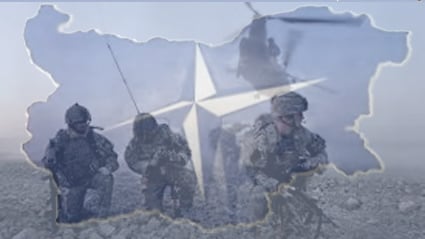
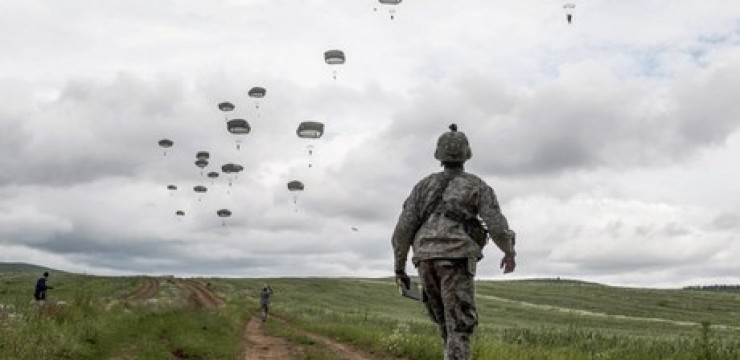



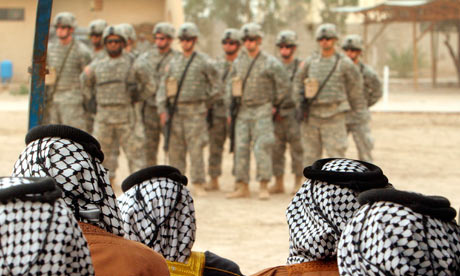








 Source : Circumpolar Action Plan Draft Volume I – Conservation Strategy for the Polar Bear – August 2014
Source : Circumpolar Action Plan Draft Volume I – Conservation Strategy for the Polar Bear – August 2014

 Source: http://sciences.blogs.liberation.fr/home/2014/01/banquises-arctique-et-antarctique-sopposent.html
Source: http://sciences.blogs.liberation.fr/home/2014/01/banquises-arctique-et-antarctique-sopposent.html





 Source : Circumpolar Action Plan Draft Volume I – Conservation Strategy for the Polar Bear – August 2014.
Source : Circumpolar Action Plan Draft Volume I – Conservation Strategy for the Polar Bear – August 2014.




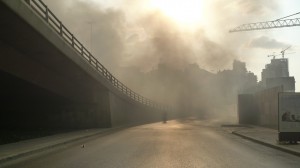


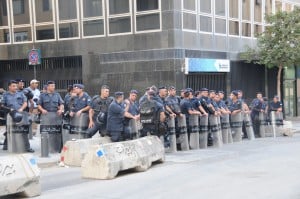
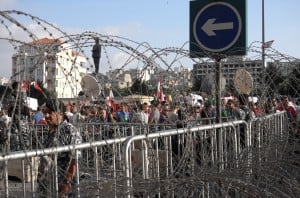
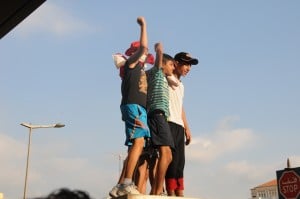




![baitblog.jpg [Related Image]](http://newint.org/features/web-exclusive/2015/08/26/baitblog.jpg)




